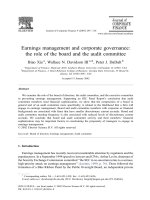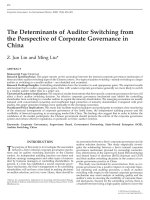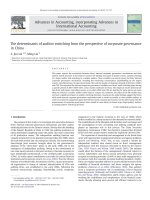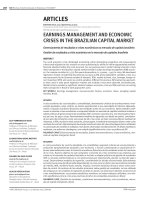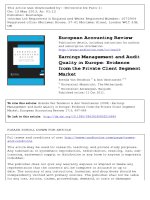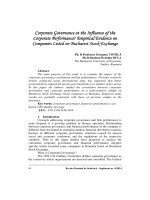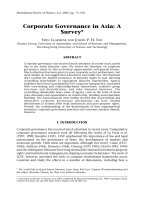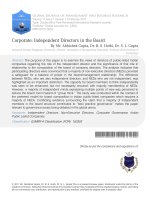Earnings management and corporate governance in the UK the role of the board of directors and audit committee
Bạn đang xem bản rút gọn của tài liệu. Xem và tải ngay bản đầy đủ của tài liệu tại đây (601.6 KB, 99 trang )
EARNINGS MANAGEMENT AND CORPORATE
GOVERNANCE IN THE UK:
THE ROLE OF THE BOARD OF DIRECTORS AND
AUDIT COMMITTEE
KANG LEI
(B.E. SHANGHAI JIAOTONG UNIVERSITY)
A THESIS SUBMITTED
FOR THE DEGREE OF MASTER OF SCIENCE
(MANAGEMENT)
DEPARTMENT OF FINANCE & ACCOUNTING
NATIONAL UNIVERSITY OF SINGAPORE
2006
ACKNOWLEDGEMENTS
This thesis is the result of my master study whereby I have been accompanied and
supported by many people. I am glad to have the opportunity to express my gratitude
for all of them.
I am deeply grateful to my supervisor, Professor Mak Yuen Teen. His guidance,
encouragement and patience have been tremendous help for me over these years.
The discussions we had in which he showed his enthusiasm and positive attitude
towards research kept me on the right track. It is my pleasure to conduct this thesis
under his supervision.
I would like to express my special thanks to Professor Trevor Wilkins, Professor
Michael Shih, and Professor Alfred Loh for monitoring my work, reading and
providing valuable comments on the thesis. I would also like to thank many other
professors and staffs in the business school who have provided generous assistance
to me during these years.
Finally, I take this opportunity to express the profound gratitude from my deep heart
to my beloved family members for their love and continuous support.
i
TABLE OF CONTENTS
CHAPTER 1 INTRODUCTION ...............................................................................................1
CHAPTER 2 LITERATURE REVIEW AND CORPORATE GOVERNANCE IN
THE UK ..........................................................................................................................................6
2.1 Review of literature on earnings management .............................................................6
2.1.1 Incentives of earnings management ........................................................................6
2.1.2 Consequences of earnings management.................................................................9
2.1.3 Research design issues in earnings management studies .................................11
2.2 Review of literature on the board of directors............................................................14
2.3 Review of literature on the audit committee...............................................................19
2.4 Corporate Governance in the UK .................................................................................23
CHAPTER 3 HYPOTHESES DEVELOPMENT................................................................28
3.1 The role of the board of directors..................................................................................28
3.1.1 The independence of the board from management ............................................29
3.1. 2 Competence of outside directors ..........................................................................33
3.1.3 Ownership of outside directors ..............................................................................36
3.1.4 Activities of the board ..............................................................................................36
3.2 The role of the audit committee ....................................................................................37
3.2.1 Independence of the audit committee ...................................................................39
3.2.2 Financial expertise of audit committee members...............................................41
3.2.3 The audit committee’s activities ............................................................................42
CHAPTER 4 RESEARCH DESIGN ......................................................................................44
4.1 Measurement of earnings management .......................................................................44
4.2 Earnings benchmarks.......................................................................................................47
4.3 Regression Analysis .........................................................................................................49
4.4 Sample selection ...............................................................................................................52
CHAPTER 5 RESULTS AND DISCUSSION .....................................................................54
5.1. Descriptive statistics .......................................................................................................54
5.2. Univariate Analysis .........................................................................................................56
5. 2. 1. Board Characteristics ............................................................................................56
5.2.2. Audit Committee Characteristics ..........................................................................61
5. 3. Multivariate Analysis ....................................................................................................63
5. 4. Additional Analysis........................................................................................................72
5.4.1 Big Bath Hypothesis.................................................................................................72
5.4.2 Analyst Forecast as Earnings Benchmark ............................................................74
5.4.3 Definition of board independence .........................................................................76
5.4.4 Lack of independence ..............................................................................................77
ii
5.4.5 Further analysis of outside directors’ tenure .......................................................78
CHAPTER 6 CONCLUSIONS................................................................................................80
REFERENCES ............................................................................................................................87
iii
SUMMARY
This thesis investigates whether the corporate governance has an effect on the level
of earnings management (as measured by income-increasing and income-decreasing
discretionary current accruals). In particular, we examine the relationship between
characteristics of the board/audit committee and earnings management with a sample
of large, publicly-traded UK firms.
We find that the independence of the board from management is negatively related to
the level of income-increasing earnings management. The average tenure of nonexecutive directors and the board meeting frequency also contribute to a reduction in
the level of earnings management. In contrast, we find little evidence that the
independence and financial expertise of audit committees constrain the level of
earnings management, and only the audit committee meeting frequency shows
negative association with income-decreasing earnings management. Our findings
suggest that the board of directors and audit committee may constrain earnings
management activities, and provide implications researchers and regulators.
iv
LIST OF TABLES
Table 1 Sample selection.................................................................................................................53
Table 2 Descriptive statistics of explanatory and control variables ................................................55
Table 3 Discretionary Current Accruals ..........................................................................................56
Table 4 DCA as a function of earnings benchmarks and the board’s independence .......................58
Table 5 DCA as a function of earnings benchmarks and the directors’ competence.......................59
Table 6 DCA as a function of earnings benchmarks and the directors’ stock ownership................60
Table 7 DCA as a function of earnings benchmarks and board meeting frequency........................61
Table 8 DCA as a function of earnings benchmarks and the audit committee characteristics ........62
Table 9 Model 1 Regression results ................................................................................................66
Table 10 Model 2 regression results................................................................................................67
Table 11 Model 3 Regression Results .............................................................................................69
Table 12 Pearson Correlation among explanatory variables ...........................................................71
Table 13 Mean of Discretionary Current Accruals for the samples with extreme bad
performances ...................................................................................................................................73
Table 14 Model 1 and 2 Regression Results with Analyst Forecast as benchmark.........................75
Table 15 Regression results of Model 1: replacing percentage of outside directors with
percentage of independent directors on the board...........................................................................77
v
Chapter 1
Introduction
CHAPTER 1
INTRODUCTION
Reported earnings powerfully influence a firm’s full range of business activities and
its management decisions. Earnings could affect investors’ evaluations of a firm,
impact its financial leverage or determine the compensation of managers. To
maintain the earnings at the desirable level, managers have a strong incentive to
adjust earnings figures. Furthermore, the flexibility of general accepted accounting
principles (GAAP) provides managers with considerable ability to manipulate
accounting earnings. Thus, the practice of management using judgment in financial
reporting and in structuring transactions to alter earnings emerges and this is known
as “earnings management” [Healy and Wahlen (1999)].
Earnings manipulation has drawn the serious attention of regulators, the financial
press and academic research. For example, at the NYU Center of Law and Business
Conference in 1998, Arthur Levitt, the Chairman of the US Securities and Exchange
Commissions (SEC) at the time, expressed his great concern over the adverse effects
of earnings management on the US capital market. In his speech, he claimed
earnings management impaired the reliability of financial reporting and weakened
investors’ confidence, and he urged the SEC to be committed to taking serious action
against earnings management. Hence, how to constrain the adverse effects of
earnings management and improve the quality of financial reporting are very critical
1
Chapter 1
Introduction
issues.
The board of directors and the audit committee play a crucial role in restraining
earnings management in a firm. They are responsible for monitoring managers on
behalf of shareholders and overseeing the financial reporting process. However, the
boards of directors of public firms are generally considered as passive entities which
are controlled by management. Many corporate governance reports [Blue Ribbon
Committee (BRC) Report 1999, the Cadbury Report (1992), the Combined Code
(1998), and the revised Combined Code (2003)] proposed “best practice”
recommendations to improve the effectiveness of the board of directors and the audit
committee. More recently, pursuant to the passage of the Sarbanes-Oxley Act 2002,
the SEC and the stock exchanges in the U.S. introduced requirements for a majority
of the board of directors to be independent of management, tightened considerably
the definition of independence, and required the audit committee to be comprised
entirely of independent directors who are financially literate and with at least one
member being a financial expert. The objective of this thesis is to empirically
examine the effects of some of the “best practices” by studying how the board of
directors and audit committees affect the level of earnings management.
This thesis examines the relation between certain attributes of the board and audit
committee, and earnings management. The attributes studied here are the proportion
of outside directors, the competence of outside directors, their compensation
2
Chapter 1
Introduction
schemes and the activities of the board and audit committee. Earnings management
is measured as discretionary current accruals which are estimated from the Modified
Jones Model. The manager’s incentive to manipulate earnings around certain targets
is also taken into consideration. This research is conducted with a sample of large,
publicly-traded UK firms, since the board/audit committee characteristics of UK
firms are more diverse than those of US firms.
The results of this thesis show that some board characteristics are related to the level
of earnings management. Outside directors on the board help to restrain a manager’s
earnings management behavior when unmanaged earnings are in the loss position.
When the unmanaged earnings are less than those of the previous year, a
combination of the roles of CEO and Chairman in the same person as well as the
extra compensation of outside directors is positively related to the level of earnings
management. In addition, higher average tenure of outside directors and higher
frequency of board meetings contribute to a reduction in the level of earnings
management. The above results, except those on tenure, are supportive of the
recommendations of the UK Combined Code.
In addition, there is little evidence that the board of directors constrains the incomedecreasing earnings management when unmanaged earnings already exceed the
targets. Further, the independence and financial expertise of audit committees do not
have significant associations with the level of earnings management. Finally, more
3
Chapter 1
Introduction
frequent audit committee meetings reduce income-decreasing earnings management
when unmanaged earnings are higher than those of the previous year.
By selecting UK firms for analysis, this study could enrich the literature on the
relationship between board monitoring and financial reporting. To date, most studies
in this field have been US-based, while only a few have provided evidence from the
UK, e.g., Song and Windram (2004), Peasnell et al (2000), and Peasnell et al (2005).
Song and Windram (2004) find some links between the board and audit
characteristics and violations of accounting standards, by using a sample of
companies which were identified by the Financial Reporting Review Panel (FRRP)
for publishing defective financial statements. Unlike Song and Windram (2004),
Peasnell et al (2000) and Peasnell et al (2005) study board and audit committee
monitoring on earnings management which is within the boundary of GAAP, but
they focus only on the effects of two characteristics, board independence and audit
committee existence. This thesis is a more comprehensive study on the effects of
various characteristics of the board/audit committee on earnings management.
This study also extends the research on board effectiveness by including the
compensation of the directors as a determinant. It is likely that the performance of a
director varies, depending on how they are compensated. However, few previous
studies have taken such financial motivation of the non-executive directors into
consideration. The results of this study show that the directors who are not receiving
4
Chapter 1
Introduction
any extra benefits from the company or who are holding more shares are more
capable of constraining earnings management. Such results may be helpful to the
company in designing more effective compensation packages for non-executive
directors.
The remaining chapters of this paper are organized as follows. Chapter 2 provides an
overview of corporate governance in the UK and reviews the literature on earnings
management and corporate governance. Chapter 3 develops the hypotheses to be
tested. Chapter 4 discusses the data sources and describes research methodology.
Chapter 5 presents and discusses the results of the empirical analyses, and Chapter 6
summarizes the results and draws conclusions. It also makes recommendations for
future research.
5
Chapter 2
Literature Review and Corporate Governance in the UK
CHAPTER 2
LITERATURE REVIEW AND CORPORATE
GOVERNANCE IN THE UK
2.1 Review of literature on earnings management
In contrast to accounting frauds which violate Generally Accepted Accounting
Principles (GAAP), opportunities for earnings management are inherent in the
current financial reporting system. Within the boundaries of GAAP, managers have
several avenues to manipulate earnings. They can choose an accounting method to
either advance or delay the recognition of revenues and expenses, use discretion
relating to the application of the chosen accounting method, or adjust the timing of
asset acquisitions and dispositions to alter reported earnings [Teoh et al (1998a)]. Xie
et al (2003) argue that the nature of accrual accounting offers managers considerable
discretion in determining earnings in any given period. Since earnings management
has drawn significant attention from regulators, the financial press and academic
research, there have been many studies on this topic which mainly focus on
incentives of earnings management and consequences of such behavior.
2.1.1 Incentives of earnings management
Various incentives can induce managers to manipulate earnings. Some incentives
may be provided by contractual arrangements (management compensation, debt and
6
Chapter 2
Literature Review and Corporate Governance in the UK
dividend covenants, etc) based on accounting earnings because it is likely to be
costly for shareholders and creditors to detect earnings management [Watts and
Zimmerman (1978)]. Both Healy and Palepu (1990) and DeAngelo, DeAngelo and
Skinner (1992) conclude that there is little evidence of earnings management among
firms close to their dividend covenant. DeFond and Jiambalvo (1994) find that
sample firms accelerate earnings prior to breaking lending covenants. Healy (1985)
shows that firms with caps on bonus plans are more likely to defer income when the
cap is already reached, compared to firms without caps on bonus plans. DeAngelo
(1988) finds that managers tend to manipulate earnings upwards during a proxy
contest. Cornett et al (2005) find that option-based compensation of managers
strongly encourages earnings management. The above empirical results suggest that
the lending contracts and management compensation contracts provide incentives for
at least some firms to manage earnings.
In some cases, earnings management is motivated by regulatory considerations.
Previous studies show strong evidence that managers would manipulate earnings to
circumvent industry regulations. For example, Moyer (1990), Scholes et al (1990)
and Beatty et al (1995) find that banks overstate loan loss provisions and understate
loan write-offs when they are close to minimum capital requirements. Reducing the
risk of an anti-trust investigation or seeking government subsidy is another
regulatory incentive for earnings management. Cahan (1992) finds that firms under
anti-trust investigation report income-decreasing abnormal accruals, and Jones (1991)
7
Chapter 2
Literature Review and Corporate Governance in the UK
shows that firms seeking import relief manipulate earnings downwards.
Some studies focus more on incentives provided by capital markets. Accounting
information, such as earnings, is considered so important for the capital market in
valuing the firm that managers would manipulate earnings to avoid unfavorable
earnings news [Dechow and Skinner (2000)]. Some studies examine earnings
management when in the process of undertaking capital market transactions. For
instance, Teoh et al (1998a, b) and Erickson and Wang (1999) show that firms
“overstate” earnings prior to seasoned equity offerings (SEOs), initial public
offerings (IPOs) and stock-for-stock mergers in order to receive favorable valuations
from capital markets.
Several studies of capital markets incentives document that managers have
incentives to manage earnings to meet certain earnings benchmarks [Burgstahler and
Dichev (1997), Degeorge et al (1999), and Jacob and Jorgensen (2005)]. These
studies show that the frequency of small positive earnings (positive earnings changes
or earnings surprise) is higher than expected; while the frequency of small negative
earnings (negative earnings changes or earnings surprises) is less than expected.
These results are explained as evidence of managers using income-increasing
earnings management to avoid reporting losses, earnings declines, or missing
forecasts of analysts. The reason why meeting such simple benchmarks is so
important to managers is probably due to the reaction of the capital market.
8
Chapter 2
Literature Review and Corporate Governance in the UK
According to Barth et al (1999), firms with continuous earnings growth are priced at
premium compared to other firms. Skinner and Sloan (2000) find that failure to meet
analyst earnings forecasts would cause a dramatic drop in stock price for growth
stocks. Since the personal wealth of top managers is tied more closely to their firms’
stock prices in the form of the stock-based compensation plans of recent years, it is
reasonable to argue that managers have strong incentives to manipulate earnings to
avoid missing earnings benchmarks. For example, Chen and Warfileld (2005) find
that firms with high equity incentives (stock options and stock ownership) are more
likely to meet or just beat analysts’ forecasts.
2.1.2 Consequences of earnings management
Practitioners and regulators often believe that earnings management is pervasive and
problematic. For example, an article in Loomis (1999) indicates that many CEOs
believe “making their numbers" is just what executives do, and “the fundamental
problem with the earnings-management culture-especially when it leads companies
to cross the line in accounting-is that it obscures facts investors ought to know,
leaving them in the dark about the true value of a business. That's bad enough when
times are good”. Former SEC Chairman Levitt (1998) also said that earnings
management is “a game that, if not addressed soon, will have adverse consequences
for America's financial reporting system” and become “a game that runs counter to
the very principles behind our market's strength and success”.
9
Chapter 2
Literature Review and Corporate Governance in the UK
Accounting academics have relatively more diverse perceptions of earnings
management than practitioners and regulators. Some academics argue that earnings
management could possibly be beneficial by providing a means for management to
convey their private information on firm performance, and that the effect of earnings
management on investors can be mitigated if the information cost is low [Schipper
(1989); Arya et al (2003)]. However, there is a potential danger of wealth loss for
shareholders when the interests of managers and shareholders are in conflict. Since
the managers are compensated both explicitly (in terms of salary, bonus, stock option,
etc) and implicitly (in terms of job security, reputation, etc) depending on the firm’s
earnings performance, they may conceal the true performance by using earnings
management to get a higher compensation or to keep their jobs at the expense of
shareholders. Since 1990, there has been an increase in the proportion of stock-based
compensation in managers’ remuneration. This increment induces managers to
manipulate earnings to obtain favorable market valuations. Moreover, earnings
management widens the information asymmetry between managers and shareholders.
Shareholders normally evaluate the price of stock and make the purchase or sale
decisions according to earnings figures. If misleading information is provided,
shareholders may make wrong decisions.
A number of empirical studies examine whether investors can see through earnings
management, and find some evidence that investors can be “fooled” by earnings
management. For instance, Teoh et al (1998b) find that IPO issuers who manage
10
Chapter 2
Literature Review and Corporate Governance in the UK
earnings aggressively perform relatively badly after the IPO, compared to those who
manage earnings conservatively. Dechow et al (1996) report a 9% decline in stock
price for firms that are being investigated by SEC for earnings management, and this
means that investors realize that the firm’s economic prospects are poorer than
previously thought. As documented in Barth et al (1999) and Skinner and Sloan
(2000), only small deviations from earnings benchmarks can result in extreme
capital market reaction, even though the cost of information to investors is quite low.
These empirical results suggest that the investors do not fully see through the
earnings management, and the wealth of outside shareholders can therefore be
adversely affected by earnings management.
2.1.3 Research design issues in earnings management studies
According to Schipper (1989) and Healy and Wahlen(1999), the academic
definitions of earnings management focus on management discretion over earnings,
and thus how to measure unobservable management discretion is one key element of
earnings management research. Three approaches are most commonly applied in
literature: estimating discretionary accruals based on aggregate accruals, estimating
discretionary accruals based on specific accruals and examining the distribution of
earnings after management.
The aggregate accruals approach is extensively used in earnings management
literature. According to McNichols (2000), 29 of 56 articles (53%) published in first-
11
Chapter 2
Literature Review and Corporate Governance in the UK
tier journals from 1993 to 1999 applied this methodology. Healy (1985) uses total
accruals as proxy for discretionary accruals. DeAngelo (1986) examines earnings
management by using the change in total accruals. Both the Healy and DeAngelo
models assume that nondiscretionary accruals are constant over time. However,
Kaplan (1985) points out that nondiscretionary accruals should fluctuate according
to the economic circumstances of the firm. Jones (1991) proposes a model which
relaxes the above assumption. The Jones model tries to estimate discretionary
accruals as the residual from the regression of total accruals on change in revenue
and gross property, plant and equipment. Dechow et al (1995) introduce a modified
version of the Jones model. The modified Jones model adjusts the change in revenue
for change in net receivables, and thus eliminates the potential measurement error
when management discretion is exercised over revenue. Among the four models
described above, the Jones model and the modified Jones model are more widely
used, as in Teoh et al (1998a&b), Erickson and Wang (1999), Matsumoto (2002) and
Kothari et al (2005). Dechow et al (1995) also compare the specifications and the
power of above models. They find that all the models appear well specified for
random samples of firm-years and the modified Jones model provides the greatest
power in detecting earnings management among these models.
Some studies have examined earnings management by modeling a specific accrual.
For example, McNichols and Wilson (1988) use GAAP to estimate discretionary
component of provision for bad debts and find evidence of income-decreasing
12
Chapter 2
Literature Review and Corporate Governance in the UK
earnings management for firms with extremely high or low earnings. Petroni (1992)
measures the discretionary accrual as an estimation error of the claim loss reserve of
property casualty insurance firms. Subsequent studies by Beaver and McNichols
(1998), Penalva (1998) and Nelson (2000) also focus on the loss reserve of casualty
insurers and find the evidence of earnings management. The main advantage of this
specific accrual approach is that researchers can better understand the behavior of a
specific accrual based on GAAP, while the main disadvantage of this approach is
that the power of the test will be reduced if the management uses accruals other than
the chosen one to manipulate earnings. Aware of this disadvantage, most of the
studies using the specific accrual approach focus on specific industries such as
banking and insurance, so that the researchers have more institutional knowledge to
identify the accruals subject to management discretion.
The third approach for detecting earnings management is to examine the distribution
of reported earnings. Literature on this approach began with Burgstahler and Dichev
(1997) and Degeorge et al (1999). These studies hypothesize that managers have
incentives to avoid missing certain benchmarks such as zero earnings, prior year’s
earnings and analyst forecast, and hence examine the distribution of reported
earnings around these benchmarks. Both studies find a higher than expected
frequency of firms with slightly positive earnings /earnings changes/earnings
surprise and lower than expected frequency of firms with slightly negative earnings
/earnings changes/earnings surprise. This pattern of earnings distribution is
13
Chapter 2
Literature Review and Corporate Governance in the UK
considered as evidence that earnings are managed to avoid reporting negative
earnings, earnings declines or negative earnings surprises. The advantage of this
approach is that it allows researchers to make strong predictions of the existence of
earnings management around certain benchmarks and to assess the extent of earnings
management on the economy. However, the distribution approach has its own
limitations. First, it does not directly examine which approach is applied to
manipulate earnings. Second, it is unable to help researchers to understand the
incentives for management to achieve specific benchmarks.
2.2 Review of literature on the board of directors
The separation of ownership and control is inherent in the modern corporate
organization. However, this separation also causes an agency problem between
shareholders (the principals) and management (the agent) [Fama and Jensen (1983)].
Since shareholders generally hold more than one kind of security to diversify their
risks, and the ownership structure of a company is highly dispersed, no individual
shareholder has enough incentives and resources to ensure that management is acting
in his or her interest. To control this agency problem, corporate governance, which
encompasses a set of institutional and market mechanisms, is necessary to induce
managers with self-interests to maximize the value of the residual cash flows of the
firm on behalf of its shareholders.
There are four basic corporate governance mechanisms which are identified by
14
Chapter 2
Literature Review and Corporate Governance in the UK
Jensen (1993): legal and regulatory mechanism, internal control mechanism,
corporate take over market and product market competition. Among these corporate
governance mechanisms, the board of directors is often considered as the primary
internal control mechanism to monitor top management and to protect the
shareholders’ interests. For example, Fama (1980) argues that the board of directors
is a market-induced institution and the ultimate internal monitor of a firm. The most
important role of the board of directors is to scrutinize the highest decision-makers
within the firm.
To examine the internal control function of the board of directors, many studies have
highlighted the relationship between board monitoring and firm value. Board
monitoring effectiveness is usually measured by board composition, size or board
meeting frequency, while firm value is measured by economic performance and
financial performance. The empirical results are mixed. Weisbach (1988) finds that
firms with outsider-dominated boards are more likely to remove the incompetent
CEOs than those with insider-dominated boards, after controlling effects of
ownership, firm size and industry; and the unexpected stock on the date of the
announcement of CEO resignation supports the view that effective board monitoring
could increase firm value. Molz (1988) reports that pluralist boards which are
outsider-dominated, which separate the roles of CEO and Chairman, and which meet
more frequently, have higher average levels of performance than managerial
dominated boards. However, Hermalin and Weisbach (1991) do not find a
15
Chapter 2
Literature Review and Corporate Governance in the UK
statistically significant link between board composition and firm value measured by
Tobin’s Q. Vafeas (1999) notes that board meeting frequency is negatively related to
market-to-book ration, a proxy for firm value, while firms experience improvement
in operating performance (i.e., profitability and asset efficiency) after years of
abnormal high board meeting frequency, especially those with poor prior operating
performance.
The recent upsurge in accounting scandals at prominent companies (Enron, Tyco and
Worldcom, etc) has largely shaken investors’ confidence. The failure was blamed on
weak corporate governance of those firms, and thus regulators and academics
became more interested in how to improve financial reporting quality through
corporate governance mechanisms, especially regarding the board of directors. Some
studies focus on associations between the board of directors and financial reporting
fraud. For example, Beasley (1996) examines whether including a larger proportion
of outside directors could reduce the likelihood of financial reporting fraud, and the
empirical evidence is consistent with his hypothesis. This paper also analyzes the
effects of outside director’s tenure, ownership and directorship, and finds a negative
association between the above characteristics and the likelihood of fraud. Dechow et
al (1996) investigates firms subject to enforcement actions by the SEC for
overstating earnings, and find they generally have weak governance structures, such
as a high proportion of insiders on boards, significant stockholdings of inside
directors, and combining the roles of CEO and Chairman in one person.
16
Chapter 2
Literature Review and Corporate Governance in the UK
The results of Beasley (1996) and Dechow et al (1996) suggest a link between the
board of directors and financial reporting quality, but they only focus on extreme
cases in which the companies have violated GAAP. It is another question whether
this link also exists for earnings management which is within the boundary of GAAP,
but greatly concerns the public and regulators. Existing research generally supports
the link. Klein (2002a) examines whether the compositions of the board and audit
committee relate to earnings management measured by adjusted abnormal accruals.
Negative relationships are found and the level of abnormal accruals increases when
the independence of the board or audit committee decreases. Xie et al (2003) extend
the research by taking into consideration more board characteristics (background of
outside directors and board meeting frequency), and the empirical results show that
independence, financial background and board meetings are helpful in preventing
earnings management. Cornett et al (2006) examine earnings management at large
publicly-traded bank holding companies, and find that this practice can be reduced
by increasing the independence of the board.
Most studies in this field [e.g., Klein (2002a), Xie et al (2003) and Cornett et al
(2006)] concentrate on firms in the US market. The results may be different for firms
in other countries due to different institutional environments. Using firms listed in
Singapore and Kuala Lumpur Stock Exchange, Bradbury et al (2004) find that board
size is related to lower abnormal accruals, while the board independence is not
17
Chapter 2
Literature Review and Corporate Governance in the UK
related to earnings management, which is inconsistent with the results of most US
studies. Park and Shin (2004) examine whether outside directors can restrain the
level earnings management in Canada. Results indicate that managers have incentive
to manipulate earnings to avoid reporting losses or earnings declines. Inconsistent
with their hypothesis, adding outside directors on board does not reduce earnings
management by itself, but including outside directors from financial institutions
helps to restrain income increasing earnings management. The possible explanations
for why outside directors are not effective in curbing earnings management are the
highly concentrated ownership structures of Canadian firms and the lack of a welldeveloped labor market for outside directors. Like Park and Shin (2004), Peasnell et
al (2005) also study the relationship between board composition and earnings
management around earnings benchmarks. Their study stands out in selecting UK
firms as samples which have as highly dispersed ownership structures as US firms
but which have more diversified board characteristics. The results show that the
proportion of outside directors is negatively related to the level of income-increasing
earnings management, but has no effect on the level of income-decreasing earnings
management while unmanaged earnings is high.
In conclusion, the agency theory suggests that the board of directors is an essential
tool for monitoring management on behalf of shareholders in order to alleviate
agency costs. There is an increasing volume of literature which examines how the
board of directors could affect firm value and financial reporting quality, or more
18
Chapter 2
Literature Review and Corporate Governance in the UK
specifically, earnings management. Although inconclusive, the empirical results from
academic research do indicate a relationship between earnings management and
board characteristics, such as board composition, directors’ expertise and board
meeting frequency, etc. Most studies are based on US firms, while only a few
examine this topic in other territories, e.g. Bradbury et al (2004) in Singapore and
Malaysia, Park and Shin (2004) in Canada and Peasnell et al (2005) in the UK. My
thesis will be an extension of Peasnell et al (2005) in examining the effects of more
comprehensive board characteristics and more current data.
2.3 Review of literature on the audit committee
The board of directors has an important role in corporate governance. The board
usually delegates some authority and assigns specific functions to several
committees which consist of subsets of board members. Since each committee has
its own duties, the board’s performance in certain aspects is also related to the
effectiveness of the committee which is in charge of this function. The audit
committee plays an important role in helping the board discharge its responsibility to
oversee the firm’s financial reporting process. As defined in Klein (2002a), the work
of the audit commitment is to “meet regularly with the firm’s outside auditors and
internal financial managers to review the corporation’s financial statements, audit
process and internal accounting controls”. Thus, an effective audit committee should
be able to protect shareholders’ interest and reduce the information asymmetry
between inside managers and outsider shareholders by improving the quality of
19


